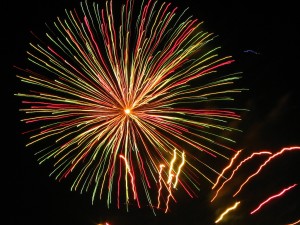And if you're wondering about the weekend weather: National Weather Service/Bay Area-Monterey
Now back to a little Independence Day fireworks history: Unsurprisingly, our loud celebratory habits have often met with frowns and finger-wagging. "The Glorious Fourth of July: Old-Fashioned Treats and Treasures from America's Patriotic Past" notes a 1731 Rhode Island law levied fines against "any person who fires any gun, pistol, rocket, squibs, or other fire-works, in any road, street, lane or tavern or other public house, after sunsetting and before-sunrising."
Another slender volume of holiday lore, "Fireworks, Picnics, and Flags: The Story of the Fourth of July Symbols," includes this 1866 observation said to have been penned by a resident of Germantown, Pennsylvania: "July 4th is the most hateful day of the year, when the birth of democracy is celebrated by license and noise. All last night and all of today, the sound of guns and firecrackers around us never stopped. It is difficult to feel patriotic on the Fourth of July. "
In 1876, the centennial of the Declaration of Independence, the National Board of Fire Underwriters' Committee on Statistics issued a report that found that losses from fireworks that year totaled $154,087.35. The committee had surveyed fire officials nationwide and found that, despite big centennial celebrations, the losses "were less in number than in any previous year of their remembrance."
Still, the underwriters had identified a scourge that was sweeping the nation: imported Chinese "fire-crackers."
"In appearance heathenish," the underwriters reported, "the noise of their discharge is destructive of all rational methods of celebration, the serious effects after their explosion are beyond calculation." But the report offered a calculation nonetheless: every dollar's worth of Chinese firecrackers imported caused more than $100 in direct losses by fire. The underwriters suggested that Congress ought to ban the import of the Chinese fireworks. (In more recent years, Chinese cities have tried to stamp out the use of firecrackers and fireworks, too, especially during Lunar New Year. In a story on the end of a ban in Beijing, The Telegraph reported: "The ban was imposed 12 years ago because of concern about injuries. ... The Communist Party may also have wanted to stamp out "superstitious practices" in its drive to modernise the country." I hear an echo of "heathenish" in that term "superstitious practices.")
A New York Times editorial took note of the underwriters' report and said they should "win the thanks of all order-loving Americans by preparing the way for a more rational observance of the national holiday."
Rational. Never a word I've associated with celebrations. And I'm sure the Times editorialist would have furrowed his brow had he been able to flash forward to a famous Fourth of July celebration in New York:
"Nobody at the Fourth of July block party outside the Bergin Hunt and Fish Club in Ozone Park seemed to care that John Gotti was footing the bill.
All day long, hot dogs and hamburgers sizzled on barbecue grills. Children, with dripping ice-cream cones and sticky cotton candy, darted through the maze of grown-up legs. The Kiddie Kastle moon walk shook with bounding, squealing children. American flags flew from the well-kept brick-and-frame row houses on the side streets.
For 20 years, Mr. Gotti, the reputed head of the Gambino organized-crime family, has given a free party for the Queens neighborhood on 101st Avenue between 98th and 99th Street every Independence Day. Every year, the party ended with blazing skies of fireworks.
This year, the party was more than a party. It was a street drama. Defying strict police orders not to use fireworks, men on rooftops lighted up the skies with rockets and starbursts. Below them, 3,000 people chanted and cheered. And when Mr. Gotti emerged from the heavily guarded club at 9:45 P.M. and waved to the crowd, the cheers got louder."
